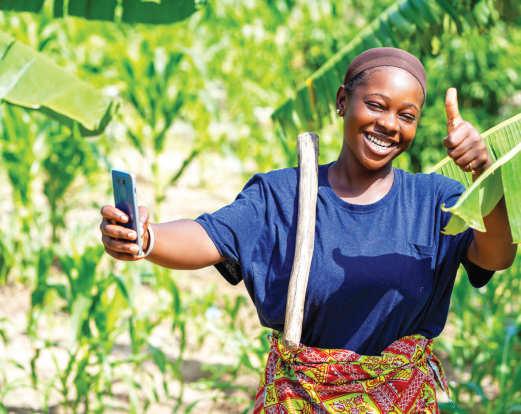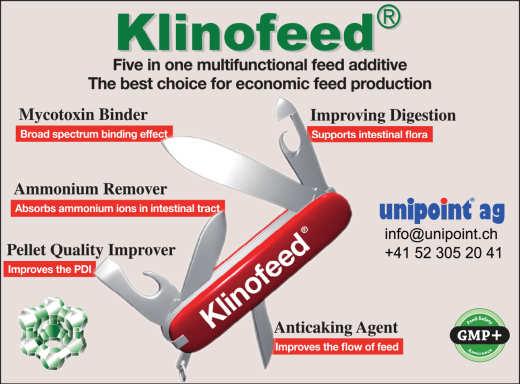
11 minute read
Transforming agriculture through financial innovations
RURAL FINANCE PLAYS a crucial role in the development and transformation of agriculture in Africa. Over the past two decades, world agricultural markets have experienced consistent growth, presenting numerous opportunities for agri-businesses in developing countries. However, the realisation of this potential has been hindered by the limited access to agricultural finance, predominantly sourced from informal channels.
Recognising the significance of inclusive finance in promoting rural transformation, the Food and Agriculture Organisation (FAO) actively addresses the constraints that impede the provision of financial services to smallholder families, including women and youth, as well as small agri-businesses. The objective is to stimulate investment, mitigate risks, and support the rural poor.
FAO collaborates with governments, producer organisations, agri-businesses, and financial institutions, including the regional Rural and Agricultural Credit Associations (RACA) established with FAO's assistance in the late 1970s. Through this collaborative approach, FAO facilitates the development of tailored policies and regulatory frameworks for rural financial inclusion, fosters innovation within financial sectors to reach marginalised rural populations, and promotes knowledge exchange and cooperation among countries.
enterprises, women, youth, and indigenous communities.
Financial resources play a pivotal role in driving rural development in Africa. However, accessing agricultural finance remains challenging due to the dominance of informal sources. To address this issue, the FAO is working to improve access to finance for smallholder families, small agri-businesses, women, and youth.
FAO collaborates with governments, producer organisations, agri-businesses, and financial institutions to develop tailored policies and regulatory frameworks. By addressing both supply and demand-side constraints, FAO aims to enhance the flexibility, diversity, affordability, and accessibility of financial products and services offered by formal financial institutions.
Policy coordination across government agencies, such as Ministries of Finance, Agriculture, and Social Affairs, along with central banks and financial regulators, is essential. Collaboration with financial institutions and private agribusiness firms is also encouraged to ensure scalable and cost-effective interventions that reduce constraints in rural financial markets.
Gender equality is a priority, and policies must consider the financial needs of women and the limitations faced by financial institutions in supporting them. FAO promotes innovative approaches, including information and communication technology (ICT), product and process improvements, and partnerships, to deliver demand-driven, customer-centric financial products and services. Special focus is given to traditionally excluded groups such as farming families, small- and medium-sized agribusiness
Amid the COVID-19 pandemic, policies should aim to promote access to a range of financial services for vulnerable rural populations. Cash transfer schemes can enhance livelihood resilience and food security for informal workers, women, and youth. Additionally, providing short- and medium-term credit to micro-, small-, and medium-sized businesses can mitigate the impact of lockdowns and reduced demand. The digitalisation of financial services is crucial, requiring comprehensive efforts at both the supply and demand sides.
Rural and agricultural financial products have the potential to significantly impact the livelihoods of African populations, especially considering that more than 60% of people in subSaharan Africa depend on the agricultural sector for their livelihoods. However, access to these financial products remains limited, particularly in rural areas where the majority of the population resides.
The impact of different types of rural and agricultural financial products on African populations has been studied, although its understanding is still limited. The Evans School Policy Analysis & Research Group (EPAR), in partnership with the MasterCard Foundation, conducted a review of 38 high-quality studies focused on sub-Saharan Africa. These studies examined the effects of financial products such as microcredit, savings, insurance, and mobile money on measures of production, consumption, wealth, and resilience.
Microcredit programmes, which provide small loans to poor individuals, including rural farmers, have shown positive impacts on household incomes. Savings products have helped farmers build assets and prepare for seasonal shocks inherent in agriculture. Crop insurance has reduced risk for farmers from extreme weather events, while health insurance has protected them from unexpected health expenses. Mobile money has facilitated easier and more accessible financial transactions for rural populations.
However, the impacts of these financial products vary across different studies. While some studies have reported significant positive impacts, such as increased household incomes and reduced child labour, others have found no significant effects on crop production or profits. It is worth noting that the impact of these products can differ among individuals, with some benefiting, while others may experience negative outcomes.
In recent years, technology has transformed the accessibility of finance for smallholder farmers in Africa, as highlighted by Centre for Strategic & International Studies commentator, Connor M. Savoy. These farmers, constituting the majority of agricultural workers in Asia and sub-Saharan Africa, are essential contributors to food production. However, they face numerous challenges, including limited access to critical inputs, inadequate infrastructure, and post-harvest losses.
Access to finance remains a critical barrier for smallholder farmers. Local financial institutions perceive them as risky, lacking specialised products for the sector, while the farmers themselves often lack collateral or are averse to financial exposure. The resulting funding gap amounts to US$170bn in Africa, Latin America, and Asia.
To address this, development finance institutions (DFIs) have embraced innovative financial models. Notably, organisations like One Acre Fund and Babban Gona offer credit for essential inputs, thereby increasing yields and incomes. DFIs play a pivotal role in de-risking investments, encouraging local financial institutions to support smallholders. The US International Development Finance Corporation (DFC) has actively provided loan guarantees and direct loans to entities like One Acre Fund.
To deepen financial services, Savoy suggests several steps for DFIs. Developing specialised personnel in agricultural investment is crucial to creating targeted financial products. Localising investments and understanding hyperlocal needs will strengthen their presence. Innovative financial products, including local currency loans, can cater to smallholder farmers' unique challenges, complemented by technology-driven solutions.

Partnerships with successful organisations like One Acre Fund and Babban Gona are essential for maximising impact. These partnerships, along with grant-based technical assistance, empower farmers with necessary skills and knowledge for qualifying for loans.
In essence, technology-driven financial innovations have the potential to transform the lives of smallholder farmers in Africa.

Through the concerted efforts of development institutions and DFIs, these farmers can overcome challenges, increase productivity, and achieve economic and social development gains. Savoy's insights underscore the transformative power of technology in uplifting those who sustain the future of agriculture.
Mobile financial services (MFS) have emerged as a potential game-changer in the domain of agricultural finance for smallholder farmers in Africa, addressing the challenges posed by poor transportation and communication infrastructure, small financial transactions, and inherent risks associated with smallscale farming. Over the last two decades, various digital financial services accessible through mobile phones, including mobile money, mobile banking, mobile payments, mobile savings, and mobile loans, have become increasingly available, holding the promise to overcome traditional banks' limitations in serving the small farm sector.
Empirical evidence drawn from nationally representative data of farmers in Kenya sheds light on the impact of MFS on African farmers. The findings reveal that more than 82% of farmers utilise mobile money, while close to 20% use mobile banking — a notable trend considering Kenya's pioneering position in MFS innovation, particularly with its successful mobile money service MPESA introduced in 2007.
However, the application of MFS for agricultural activities remains limited. Only 15% of farmers reported using mobile money for agricultural payments, with fewer than 10% employing mobile money or mobile banking savings for agricultural finance. Merely 0.6% mentioned utilising mobile banking loans for agricultural purposes, indicating that MFS has yet to significantly penetrate the agricultural sector. These low usage rates may be attributed to the lack of tailor-made financial services catering to the specific needs of the local agricultural industry.

Differences in MFS usage were observed between farmers operating in different marketing channels. Farmers selling directly to end-consumers in local markets exhibited minimal MFS adoption. In contrast, farmers selling to traders and companies displayed higher usage rates, but still below anticipated levels. This underutilisation can be attributed to the limited incentives for farmers in traditional local supply chains to switch from cash transactions to digital payments, which often incur fees. Additionally, farmers in modern supply chains, who already possess bank accounts, may find limited value in adopting mobile money for their agricultural activities.
To address these limitations, improvements and adjustments are necessary for MFS to effectively transform agricultural finance in Kenya and similar countries in sub-Saharan Africa. General infrastructure enhancements and digital literacy improvements alone may not yield substantial results since many farmers already engage with MFS for non-agricultural activities. Instead, a focused approach involving private-sector innovation and supportive regulatory environments is required.
Issues that need attention include addressing server system downtimes, transaction limits, interest rates, and repayment periods for mobile banking loans. Public-sector interventions should aim at creating consumer-friendly regulatory environments to facilitate the customisation of MFS products to better suit agricultural contexts.
Despite these limitations, MFS have proven beneficial for certain rural households in Africa, offering time savings, off-farm income opportunities, and increased incomes from remittances, which can ultimately contribute to improved agricultural productivity and higher farming incomes. Nevertheless, continuous development and customisation of MFS are vital to unlock their full potential and enhance agricultural development.
Continuing from the discussion on MFS and its potential impact on African farmers, it is essential to mention the recent development of Convergence Partners in driving digital inclusion across the continent. Convergence Partners, a leading private equity investor dedicated to the technology sector in sub-Saharan Africa, has achieved a significant milestone by successfully closing its Convergence Partners Digital
Infrastructure Fund (CPDIF) at an impressive US$296mn. This fund, which surpassed its initial target by more than 18%, represents the company's largest fund to date, bringing their total funds under management to more than US$600mn.
CPDIF focusses on investing in digital infrastructure opportunities throughout sub-Saharan Africa, including fibre networks, data centres, wireless technologies, towers, cloud computing, Internet of Things (IoT), artificial intelligence (AI), and other critical digital assets that support the growth of the digital economy in the region. Additionally, the fund aims to promote digital inclusion by supporting initiatives that provide access to education, financial services, healthcare, and other essential services through digital technologies.
The success of CPDIF underscores the increasing importance of digital infrastructure in the region, especially in the context of mobile financial services. As internet penetration continues to grow in sub-Saharan Africa, investments in enabling digital infrastructure become even more critical. Convergence Partners' efforts in driving digital inclusion will not only bridge the digital divide but also enable farmers and other stakeholders to fully harness the benefits of mobile financial services and other digital advancements. By providing the necessary digital infrastructure, CPDIF plays a pivotal role in advancing the digital economy across the African continent.
“The closing of CPDIF is a major step forward for Convergence Partners and for the development of the digital economy in subSaharan Africa,” remarked Brandon Doyle, CEO and founding partner, Convergence Partners. “This closing is just the beginning, and we look forward to working with our investors and partners to build the digital infrastructure required to support the growth of the region's digital economy. We strongly believe such collaborations promote innovation, entrepreneurship, skill development, and job creation by vastly expanding access to the internet and all the essential digital tools it provides.”
Further augmenting the development of rural finance, Yellow, a company that provides asset financing for solar energy and digital devices in Africa, recently secured US$14mn in series B funding in a round led by Convergence Partners. The funding round also saw participation from the Energy Entrepreneurs Growth Fund, managed by Triple Jump, and follow-on investment from Platform Investment Partners.
With the new funding, Yellow plans to further expand its operations in its current markets, which include Malawi, Rwanda, Uganda, Zambia, and Madagascar. Additionally, the company intends to introduce digital and financial products in the near future and prepare for future debt funding rounds to accelerate its growth trajectory. impact funds. The goal is to enable these intermediaries to extend loans to agri-SMEs, with a specific focus on businesses led by women and those embracing climate-smart practices.

This recent round of funding brings Yellow's total debt and equity funding raised to US$45mn, which will enable the company to continue its mission of increasing access to clean energy and digital devices across the African continent.
Building on the commitment to support Africa's agricultural sector and small and medium-sized enterprises (SMEs), the African Development Bank Group (AfDB) has made significant strides in advancing the Agri-food SME Catalytic Financing Mechanism.
Yellow intends to introduce digital and financial products to several African regions in the near future.
During the Dakar 2 Africa Food Summit, the Bank announced the establishment of this special fund aimed at de-risking and catalysing investments for agricultural SMEs, enhancing agricultural value chains, and improving food security across the continent.
SME agri-businesses play a crucial role, producing, processing, and transporting around 65% of Africa's food. However, they face an annual financing gap of more than US$180mn. To address this, the Agri-food SME Catalytic Financing Mechanism will provide concessional finance and technical assistance to financial intermediaries, such as agribusinesses, micro-finance institutions, and
The Mechanism, structured as a multi-donor trust fund, received a notable boost from Canada, which contributed US$73.5mn. By blending public funds with the Bank's financial instruments, this initiative seeks to de-risk agricultural financing and attract more private sector investment towards impactful agri-food sector projects.
“At the Africa Food Summit, we have seen a strong commitment to addressing the financing gap for SMEs and creating an environment that encourages private sector investments in climate-smart, gender-oriented agricultural solutions,” said Beth Dunford, AfDB vice president for Agriculture, human and social development. “The Agri-food SME Catalytic Financing Mechanism will help unlock opportunities for these businesses in Africa, particularly for women and youth.” h
Digital transformation in agriculture
FARMERP, THE NEXT-GENERATION farm management platform, has brought a specialised focus on helping Cassava farmers by extending the crop life & bringing plant mortality in Cassava plantations up by 40% through its tech-enabled platform.
The platform aims to unlock the true potential of the Cassava plantation for the farmers to improve productivity, profitability and predictability. The company has successfully deployed this in Nigeria and shall further expand it to Thailand, Indonesia, Angola, Ghana.
Cassava is a vital crop for millions of people globally. With its versatile applications in food, feed, and industrial sectors, Cassava is crucial in ensuring food security, livelihoods, and economic growth.
Advertisers Index
JCB launches electric wheeled Loader
JCB IS INTRODUCING its first full electric wheeled loader, delivering best-in-class performance and full working day use, with low noise and zero-emission operation being ideal for work in livestock buildings, glasshouses and alongside farm and horticultural staff.
The machine boasts the largest standard battery pack in its class, with 20kWh capacity, providing productivity that matches the popular 403 diesel model.
JCB is expanding its full electric equipment line-up, with the launch of the 403E wheeled loader, helping farms and horticultural businesses meet the challenge of carbon reduction. The machine is powered by a 20kWh lithium-ion battery pack, assembled from proven JCB modules, as pioneered in the company’s existing range of electric equipment. These batteries, coupled with high efficiency electric motors and optimised traction and hydraulic systems, deliver class-leading performance, with the loader capable of completing a full working day, or 4-5 hours of continuous use in a mixed duty cycle.
In common with the JCB E-Tech range, the 403E has a built-in charger that allows connection to a range of on-site power sources. A 110V socket will fully charge the batteries in 12 hours, while a 230V industrial or domestic plug will charge the battery pack in just 8 hours. JCB’s off-board rapid charger delivers a full charge from a three-phase supply in just 2 hours.
The machine is equipped with two independent electric motors, one for the driveline and one for the hydraulics. The drive motor offers 33.4kW of power and comes with three driving modes, that the operator can toggle between using two buttons on top of the joystick. With reduced noise levels and machine vibration, the 403E is a comfortable, highly productive zero-emission loader, capable of working with a range of attachments.
Subscription Form
I wish to subscribe to AFRICAN FARMING AND FOOD PROCESSING for 1 year (6 issues) starting with the next Issue. Europe a 94.50, Kenya Ksh1500, Nigeria N2800, South Africa R210, United Kingdom £57, USA $111

Enclosed is my cheque/draft.❑ Please send us the invoice ❑ Please debit my: Amex ❑ Visa ❑ Mastercard ❑
Card number: oooooooooooooooo
Expiry date: oo/oo Security Code: ooo
(Please note that we will debit your account in sterling).
Name Position
Organisation Telephone Fax
Address Country Email Signed Date
Subscription order can also be placed via the web: www.alaincharles.com or email at circulation@alaincharles.com











